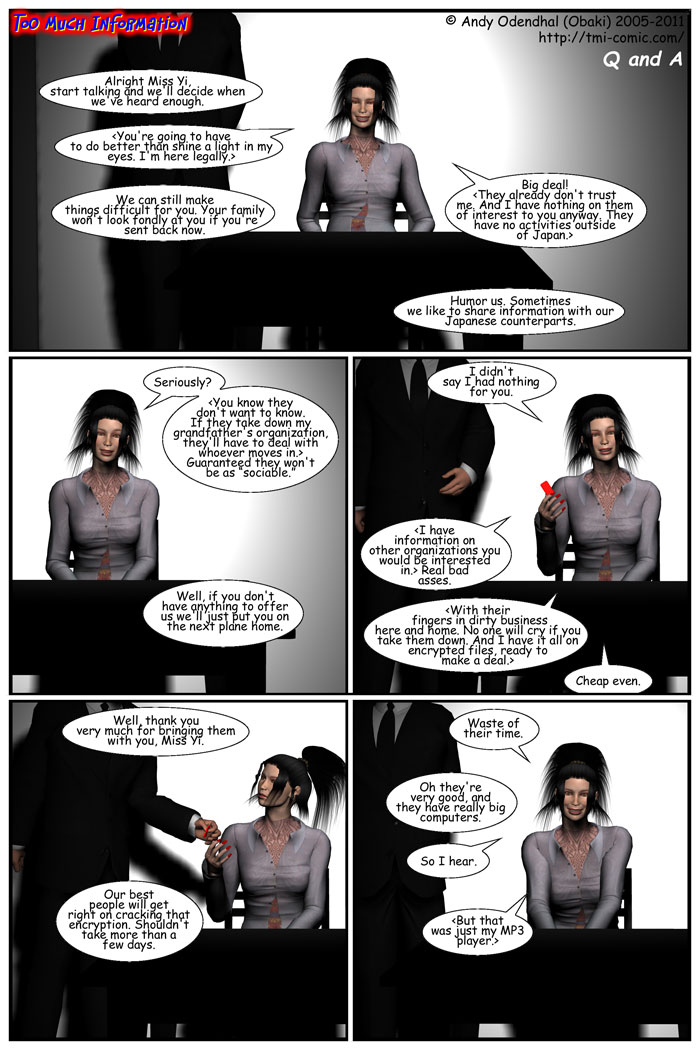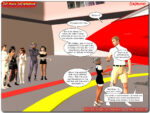Too Much Information – an online comic
An old house, a geek, a cute transvestite, a very tall lesbian, and at least one ghost–what could happen? – Adult situations and artistic nudity. Not suitable for children.
- Before Commenting
- About TMI
- Web Novel(s)
- Aelfheim
- CHAPTER 1–NAIVETY
- CHAPTER 2–CONFUSION
- CHAPTER 3–FEAR
- CHAPTER 4–COMPASSION
- CHAPTER 5–PASSION
- CHAPTER 6–EFFORT
- CHAPTER 7–DEFIANCE
- CHAPTER 8–RELAXATION
- CHAPTER 9–DECEIT
- CHAPTER 10–DISTRACTION
- CHAPTER 11–CONVERSATION
- CHAPTER 12–DREAM
- CHAPTER 13–FUGUE
- CHAPTER 14–BATTLE
- CHAPTER 15–AFTERMATH
- CHAPTER 16–SOLACE
- INTERMISSION
- CHAPTER 17–RESURGENCE
- CHAPTER 18–REVELATION
- CHAPTER 19–REFRESHMENT
- CHAPTER 20–DISCLOSURE
- CHAPTER 21–DEPARTURE
- CHAPTER 22–MEMORY
- Aelfheim
- Privacy Policy
- Archive
| S | M | T | W | T | F | S |
|---|---|---|---|---|---|---|
| « Oct | ||||||
| 1 | 2 | 3 | 4 | |||
| 5 | 6 | 7 | 8 | 9 | 10 | 11 |
| 12 | 13 | 14 | 15 | 16 | 17 | 18 |
| 19 | 20 | 21 | 22 | 23 | 24 | 25 |
| 26 | 27 | 28 | 29 | 30 | 31 | |
Control Panel
Blog Categories
Blog Archive
Recent Posts
- ComicPress 2024-10-04
- Tech difficulties 2024-09-23
- What’s stopping me… 2024-04-14
- Andy is doing better 2023-12-18
- I can’t see…?! 2022-09-27
Recent Comments
- Opus the Poet on Caste In Space
- Opus the Poet on Ready For Love
- Opus the Poet on Ready For Love
- Opus the Poet on Caste In Space
- Opus the Poet on Like Hell
- Anonymousbosch on Butch and Sundance on ‘Nip
- roundman on ComicPress
- scurvy on Butch and Sundance on ‘Nip
- Ben on Butch and Sundance on ‘Nip
- Mike Conner on Butch and Sundance on ‘Nip
- Opus the Poet on 2015-12-09
- Bobby on Butch and Sundance
- Opus the Poet on Family Matters
- Alan Cooper on Butch and Sundance on ‘Nip
- Opus the Poet on Family Matters
- anarchduke on ComicPress
- Opus the Poet on 2016-11-28
- Opus the Poet on 2008-01-02
- Hinoron on Butch and Sundance on ‘Nip
- Hinoron on Butch and Sundance







Besides there are encryption forms that depend on things like a passage from a book. Those are not able to be decrypted unless you know the passage, so it doesn’t matter how big you computer might be.
Yup, some times ‘old school’ still works best
Like, the best form of long term storage is microfiche, simply because, if the power goes out, you can still view it, all you need is a light source and a magnifying glass
Yeah, I sometimes wonder if future civilizations won’t think we went flat out illiterate because they can’t see documents that are only ones and zeros and only if the computer has electricity.
depends on how long the wayback machine lasts.
Bull, modern codes use psudo-random number generators (that means while it appears to be random, the sequence is based on the previous number and is started with a ‘seed’ number). Book passages require words that follow letter patterns and word sequences that are easier to determine than number sequences that require 1000’s of numbers before a pattern emerges.
If you use a book passage make it in a foreign language neither speak, preferably with extra characters that are not in English, don’t include spaces, put gaps maybe every 5th letter, this will at least throw a wrinkle in that they can’t use English patterns to decode it.
Modern super codes are even worse, once encrypted you then re-encrypt it over and over maybe 100 times until it’s completely scambled.
Book passages… Yea right.
Consider if said book is written in a language that shares no common letters with English like Urdu or worse uses characters that embody entire words like Kanji. Using an obscure book or even something personal particularly if it only exists in one person’s memory. These are the theory behind passphrases as encryption keys.
Crypto standards generally still require uniform character blocks and padding, usually before and after the message. Note that a book code – page-line-word – would NOT be susceptible to linguistic analysis.
If you include a 62 character shift substitution – say UPPER case – Numbers – lower case, and use the last digit of the line number and word number to give the shift for the next character group (yes, you’d likely have to roll over from 63 to 99!), then 3, 7, or 9 digit blocks would be really tough to crack.
To make it more interesting, use the date/time group to pick the character in the initial padding which starts the offset – in this case, which character is the REAL start of the message, even if it is in the middle of a block!
As far as the book goes, just ensure that everyone is using a standard set of properly paged PDFs that include at least one “year book” – Say, the Guinness Book of Records; one major league dictionary – The Random House Unabridged Dictionary of the English Language, for example; a serious set of classics – The Harvard Classics of Dr. Elliot’s Five-Foot Shelf remains a standard; and a selection of popular fiction – all of which are easily carried even on a basic smart phone or tablet, and likely to be of use by anyone traveling!
Something in the padding should also give an indication as to which book is being used, but that would need to be worked out ahead of time
Look up “All the world wants to know” for an interesting case of lousy padding.
Really odd how the languages keep shifting back and forth here. It would make more sense for this conversation to be entirely in English.